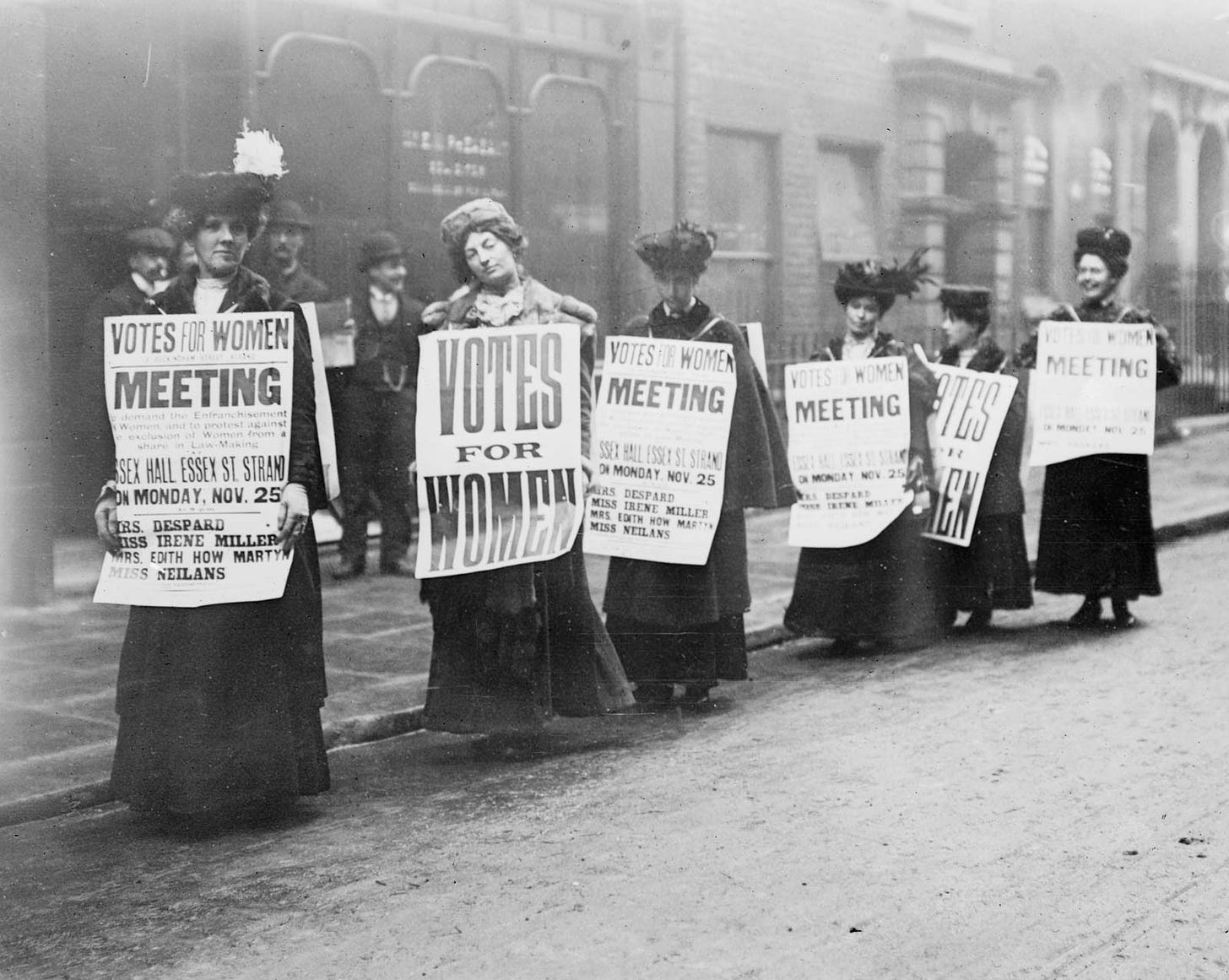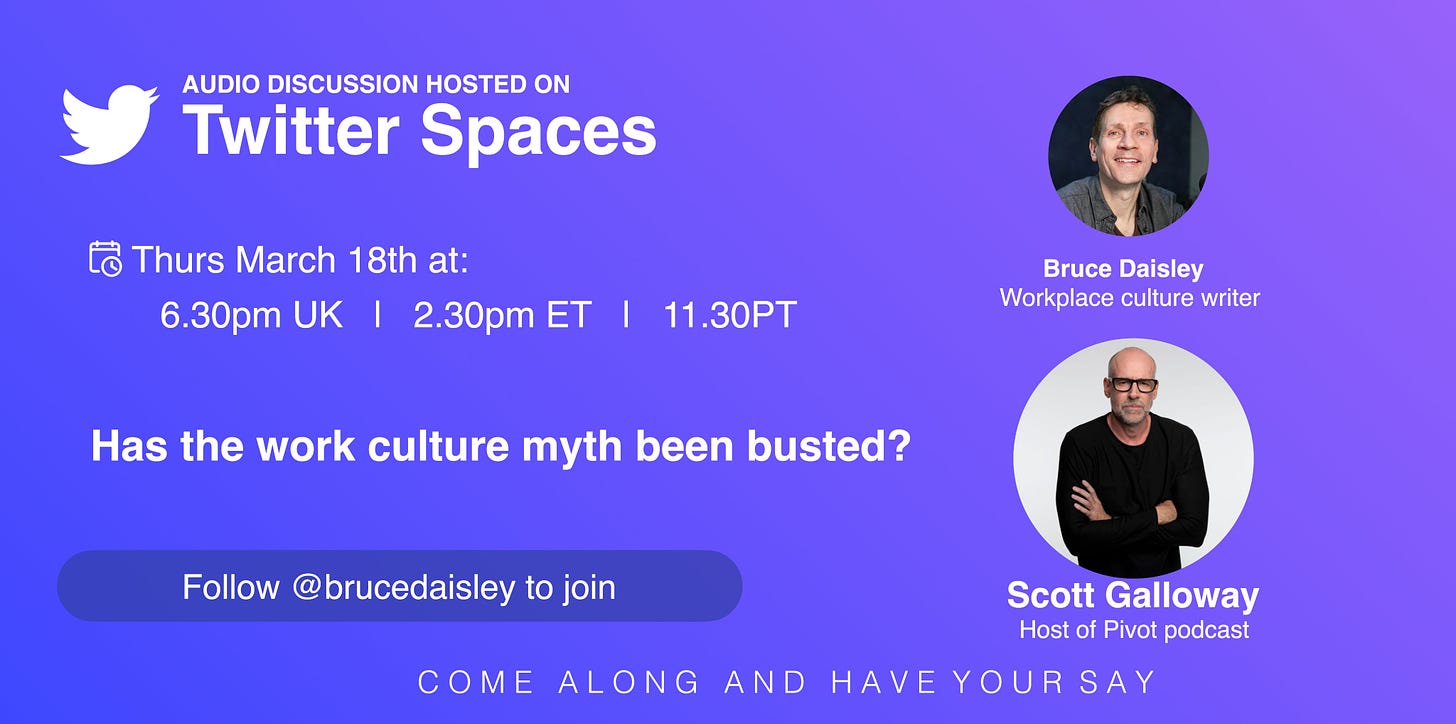Offices are a battlefront for equality
ALSO: Live chat with Scott Galloway / outcomes over hours
Make Work Better is a weekly newsletter about work & workplace culture. If you’ve ever told anyone ‘our secret is our culture’ then this is the place we’re trying to find out how to rebuild it.
During Hillary Clinton’s run for the Presidency she came up against a lot of attempts to reframe her opponent as a good guy, whose only flaw was that he was being vilified by news media angry at an insolent outsider.
Commentators and surrogates set out to frame the narrative that Trump had been joking when he talked about a ‘Muslim ban’, he hadn’t known that the journalist he mocked had been disabled, when he said that the mother of a dead US Muslim soldier hadn’t been allowed to speak he didn’t mean anything by it. To this Clinton gave a simple speech asking people to follow their eyes, not what they were being told. Quoting the great writer Maya Angelou, she said ‘when someone shows you who they are, believe them.’
Last week I ran a Twitter Spaces conversation for an audience of several hundred people (full review down the page). Rebecca Seal (author of Solo) made a point that set my pulse racing.
Earlier in the day I’d been chatting to someone from a VC fund (a classic male dominated part of the finance sector), he’d described how the leadership of the organisation was white, male and middle-aged but they knew they had to signal a recognition of changing times so they’d asked for a diversity training program to be created. Then we moved on to a discussion about the return to offices, ‘They just are just traditional and want to be back in the office, so we’re going back to the office full-time in June,’ he said.
Over the course of the last few weeks I’ve heard this a lot but it’s the first time I’ve heard lip service to diversity laid directly adjacent to office return plans. These aren’t two subjects, these are one subject. Organisations without diversity at the top are making decisions that don’t respect the differences in lived experience throughout their workforce. (I talked a little about it here: ‘Managers told us to embrace constant change, till it happened to them’)
But it was what Rebecca said later that helped me lay the two parts of the VC fund conversation next to each other: a performative, diversity course and a return to the office full-time.
On the Spaces chat Rebecca said: ‘The patriarchy wants us all back in the office - of course it does, because the old normal has served white middle class men with power very well for the last 200 years. Anything that challenges the old normal is a threat to their power - anything that opens up opportunity for women, for marginalised groups of all kinds, challenges their dominant position. Of course they want us back in the office where they can see us. But the office, 9-5 5 days a week, has never been the best way to work for many of us - for parents and carers in particular but also for people whose brains don’t suit such a rigid way of working’.
It made me realise something fundamental. The decision facing companies in the next few months isn’t about whether firms are willing to maintain some degree of hybrid working as a perk - after all workers have grafted furiously these 12 months to demonstrate it is entirely possible. It’s about holding on to the new way of working that we’ve just proved is productive and which will transform the life of millions. This isn’t a convenience issue, this isn’t a preference issue, this is a fairness issue.
A few weeks ago I documented how the year of remote working has had a gendered effect on the workforce. How millions of working mums have been forced out of employment to deal with childcare - and yes, for the people at the back it is women not men who this still disproportionately impacts. Of course it’s possible that some will argue that, ‘look this was a pandemic, we needed to take radical action and come 21st June we’ll be back at work to allow normal life to resume’. But what of the lost year of progress for those working women? The promotion opportunities that will be passed over? The decisions that were made because ‘there just weren’t enough good female candidates’?
That approach additionally misses the fact that commuting for an average of 75 minutes to work creates domestic pressures for families that generally women end up bending towards. Those of us who are willing to look have seen clearly that the last twelve months have awakened us to the injustices of the old way of working. There is privilege in being able to travel miles to reach a desk for 9am and to leave it at 6pm. It is a privilege that if it doesn’t relax to accommodate childcare, or the realities of modern life, immediately becomes an invisible barrier to a more diverse workforce. I used to work at firm where the boss - at a sign to step things up when times were tough - used to call 7.30am meetings. It was a signal of alpha machismo. An invocation to the team to ‘show how much they want it’. And behind this chest beating of a grey-haired, middle-aged man was the carnage of disrupted school drop-offs and stress-laden breakfasts for all his team members.
For years we’ve endured the fact that over 40% of women leave the workforce when they have children. They leave not because they no longer value the sense of meaning that work can provide, or because they’re done with intellectual stimulation, they leave because trying to balance the demands of life and work starts making everything intolerably stressful. When they do return the time they’ve taken off is held against them and a gender pay gap results.
Having proved that we can make a better way of working succeed, some bosses are saying ‘that wasn’t good enough’ we want you where we can see you.
The debate isn’t being helped by the voices of certain powerful asset owners trying to move the debate towards their interests. National newspapers have been hit by the end of the daily commute and are screaming for full-time office work to return (most tiresomely by the largely irrelevant City AM). Landlords are insistent that the economy will suffer unless we resume our collective madness of dashing to a desk everyday - and politicians are echoing the sentiment.
Rebecca added: ‘We mustn’t let the conversation about the future of work be dominated by loud, white male CEOs, or by poorly worded staff surveys. If we sleepwalk back into the old ways we will miss the moment of a generation, the chance to make work equitable and to design it in a way that puts human lives at the centre’.
Brilliant. If your company is trying to make the return to work feel like business as usual this is an important moment to speak up. If your firm is running a diversity program while also wanting your colleagues back in the office full-time then judge your employer by their actions not their words. If your firm is optimising the experience of work for those at the top of the hierarchy, then remember the words of Maya Angelou ‘when someone shows you who they are, believe them the first time’. The diversity program is a distraction, they’ve shown who matters.
Now is the time for action by all of us. Time to step up.
Can you start by following Rebecca and showing her some support!
More on this: listen to my discussion with Harvard Business Review’s Amy Gallo
Also: is it any wonder that diversity programs don’t work when bosses implement them so cynically
Also: Thinktank Demos says we should be using this moment to campaign for the ‘nowhere office’ where jobs are based outcomes not hours (sadly that missed using that soundbite)
Also: JJ Abrams expected to hate doing creative work remotely but he realised it was the entry point to more diverse voices being in the room (2nd headline on page)
Last week I ran my first Twitter Spaces audio chat room. It was a fun experience attended by several hundred people - as mentioned above there was wisdom from Rebecca Seal, Annie Auerbach (author of Flex) and Professor Dan Cable. My big learning was that Twitter Spaces starts on mute. If a 4 minute opening monologue happened in a forest and no one heard it, did it really happen? Yes it did. And there was no way for me to realise that not a word of it had been received by the crowd. That aside, I hope you can see from the above piece that the discussion was brilliant. Sadly recording it proved impossible first time around - but I’m going to try my best to fix that for round 2.
This week I’m doing another one - featuring a discussion with Scott Galloway, host of the incredible Pivot podcast and author of Beyond Covid and The Algebra of Happiness. I’m in awe of the punchy intellect of Scott and it’s set to be a incredible adrenalised discussion. Join us by opening the Twitter phone app at 6.30pm UK / 2.30pm NY / 11.30am SF on Thursday.
Here’s Scott on the flaws of US big business:


Antony Slumbers (who dropped in on the Twitter Spaces chat and pulled us up for talking about old white men being the problem) has written a post about the property sector - ‘this isn’t an acceleration, it’s a revolution’.
Technology has turned back the clock on productivity - Tim Harford has returned to this theme in his FT columns a number of times but he references the way that Cal Newport is asking us to rethink our jobs
More firms are announcing their return to offices. In the US broadcaster CNN sets the date for August 1st, Bloomberg has said as soon as you’re vaccinated…
Andrew Hill in the FT says ‘if [firms] allow the choice to be dictated solely by the company’s real estate footprint, they will almost certainly be making the wrong decision’
Aside: I love Switched on Pop podcast, deconstructing the changing sound of hit music. The hosts Nate Sloan and Charlie Harding did a brilliant audio-enhanced essay on NYT
Make Work Better is created by Bruce Daisley, workplace culture enthusiast. You can find more about Bruce’s book, podcast and writing at the Eat Sleep Work Repeat website. 2nd book writing progress: ████░░░░░░░░░ 31%







